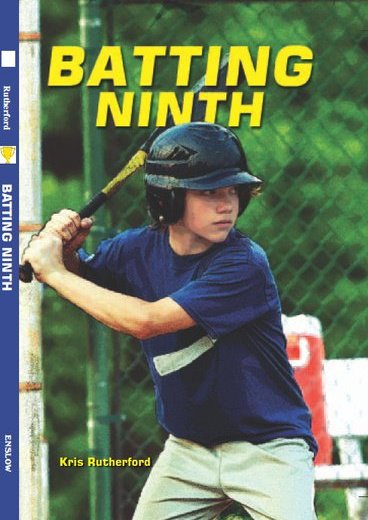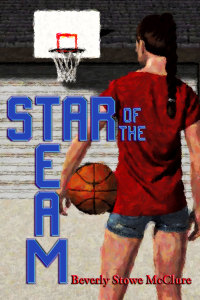Today reluctant reader turned writer Kris Rutherford shares a little bit about his writing process. You can read my review of his middle grade sports story Nothin’ But Net over on Goodreads. Welcome, Kris, and happy book b-day!
 Can a Reluctant Reader be a Decent Writer?
Can a Reluctant Reader be a Decent Writer?
by Kris Rutherford
First, let me get out one shocking fact. I don’t read much. Never have. Yep. There it is. It’s been said by many that any writer has to “read, read, read” to be successful. Well, I wouldn’t exactly say I’m successful, but I have published several articles, two fiction books, and I have a contract for a non-fiction book in hand. But, I don’t read a whole lot more than the sports page and internet news. Sure, I like to peruse books on subjects I’m interested in, but “peruse” is the key word. Read them cover-to-cover? Seldom. And, fiction? Blechhh. I don’t have the time or energy.
So, how did someone who has spent little time reading and, I swear, never “curled up with a book,” end up as a youth sports fiction writer? Well, my dad was an English professor, so when I was a kid, a bit of reading was compulsory. But, I wasn’t about to read something in which I had no interest. A novel based on a movie I had already seen was always a great option, but the novel had to be written after the movie, not the other way around. I didn’t want anybody to ruin a great movie by changing it up on me. Plus, I liked the option of skipping over the boring parts. Aside from these classic works of fiction, though, my interest was in sports. In fact, I had few interests beyond sports. I watched them incessantly, regardless of the game or season. Curling intrigued me as much as football. I’d even watch sports on the French language channel beamed into Southern Maine from Quebec, despite the fact my knowledge of French went no further than Huckleberry Finn’s “Polly-voo-franzee” (I saw the Disney version of Huckleberry Finn sometime in the mid-70s at the local drive-in, and I admit I did read—or maybe skim—the book for ninth-grade English. Personally, I found Twain’s version a little disappointing). Regardless, my young life revolved around sports—watching and playing (with limited ability and even less success).
As far as youth sports fiction is concerned, I chose to read it for two reasons: 1) I was interested in the subject matter; and 2) Even the longest work seldom exceeded 200 pages (for purely psychological reasons, I preferred to read of less than 100 pages, but I made exceptions in the case of sports). My influences were probably the same as most sports-minded kids of the 70s—Matt Christopher and Alfred Slote. I loved Christopher’s play-by-play narrative and the wide variety of sports he covered. “The Kid Who Only Hit Homers” and “Return of the Home Run Kid” remain favorites to this day. But, for me, nothing could top Alfred Slote. “Hang Tough, Paul Mather” has to be my favorite book of all-time. The main character is a Little League baseball pitcher battling leukemia but refusing to give up his favorite sport despite the risks involved. At the time I read the book, I was having some weird medical issues of my own, so maybe I thought Paul and I had something in common. Slote’s masterpiece still resonates to this day, and I even reread it on occasion some 35 years later. “My Father, The Coach” is probably my second favorite Alfred Slote work.
When I come up with an idea for sports fiction, I usually try to pluck some small memory from the back of my mind and build on it. From the perspective of a sports nut who had limited athletic ability, my main characters are typically athletically-challenged or have a flaw in their game. In my first novel, “Batting Ninth” (Enslow Publishers), the main character was a great fielder but a lousy hitter. In “Nothin’ But Net,” Blake Creekmore is about as unathletic as they come. But, his best friend is the school’s top athlete. Their rather awkward relationship and lack of common interest forms the basis for the story.
I also like to include an adult or two in each story, at least one of whom is not a great role model. My pet peeve growing up was overbearing baseball parents. In fact, in college my original intention was to become a city parks and recreation director in order to fix everything wrong with youth sports, which, in my opinion, focused generally on the adults. I soon found, however, that many of the adults who run youth sports don’t want them fixed. Local youth sports associations have become adult hobbies. As one journalist wrote many years ago, “Youth sports teach kids games adults play.” I love to weave the stereotypical “little league parent” or coach into my plots. Call it an outlet for my frustration.
Finally, as far as my writing process is concerned, I may break, or at least fracture, the mold most writers follow. When I sit down at the computer, I hold my sliver of a childhood memory and a general idea of my theme and how I want the book to end. But, everything between the first and last paragraph is an open slate. I seldom outline, don’t think too much about supporting characters until I find a need for them, and choose plot direction and subplots on the fly. For me, this process has generally been successful. While I do “revise, revise, revise” (as opposed to “read, read, read”), my initial plot usually holds up. I’ve become used to limited word counts—Lord knows I was a fan of them as a kid—and I keep these counts in mind as I’m writing. If I see a subplot consuming too many words, I hit the delete button and redirect toward the final target. My revisions normally focus on flow and, of course, mechanics.
Oh, and I only write in the first person. I’m a conversational writer. I find third-person extremely awkward and a hindrance to my sense of humor, cynicism, and sarcasm. But, I assure you there is not a touch of sarcasm in what I’ve written here. I’m not a reader, and I never have been. I’m a writer. Kind of weird, huh?
Nothin’ But Net blurb:
Blake Creekmore just cost his middle-school basketball team its shot at the district championship—and he’s not even on the team. Blake would much rather be at a Boy Scout meeting than any sporting event. He convinces his best friend Dustin, the school’s star athlete, to join him in an afternoon on the lake, where tragedy strikes. Dustin is injured and lost for the season, and Blake bears the blame of the team, the coach, and his classmates.
Battling his guilt, Blake seeks refuge in the activity he knows
best—bass fishing and enjoying the outdoors. With the support of his father, a local bait shop owner, and a most unlikely character, Blake learns the importance of friendship and what it takes to be a member of a team. And, in the process, he unwittingly teaches his classmates a few lessons about life and the environment as well.
Nothin’ But Net is available on the MuseItUp bookstore and Amazon.
 About the Author:
About the Author:
Kris Rutherford has been a recreation and natural resources management professional for nearly 25 years and has been involved in youth sports as a player, volunteer, coach, and administrator his entire life. He holds a Master of Agriculture from Colorado State University and majored in Recreation Administration at Arkansas Tech University.
Nothin’ But Net is Kris’ third published book. He has also authored the youth sports novel Batting Ninth and a non-fiction work, Homeseekers, Parasites, and the Texas Midland: The Texas League in Paris, 1896-1904. In addition, he has published a number of articles in professional Recreation and Parks and Municipal Government journals.
Kris has held positions with Arkansas State Parks and the Arkansas Game and Fish Commission and currently serves as Grants Officer for the University of Arkansas Division of Agriculture. He lives in Maumelle, Arkansas, with his wife and three children. For more about Kris and his books visit his website.ague in Paris, 1896-1904. In addition, he has published a number of articles in professional Recreation and Parks and Municipal Government journals.


 Can a Reluctant Reader be a Decent Writer?
Can a Reluctant Reader be a Decent Writer? About the Author:
About the Author:


















